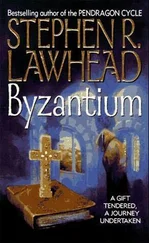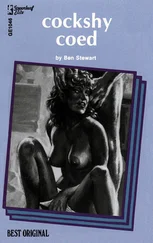It was late September. Already a thousand Hebronites had settled the island, and the chosen city was a trim cluster of cabins and cottages spread along the back of the bay. Directly after we stepped onto the dock we were taken to the Temple and brought one by one before the Council of Elders. To them we professed our faith in the Lord and His Revelator, Josiah Kershaw. Our covenant recorded, the elders gave us our tasks. There was no demand for instruments, so I was sent to a stout, red-cheeked cooper named Pickle. I was his only worker. He gave me a corner of his cabin for my quarters and allowed me to hang my violin in the window, in the small hope of attracting customers for my own trade. My first night on the island he told me his story. A widower, he’d left five grown children behind after hearing Josiah’s call in Toledo. He’d been taking part in a Presbyterian synod on hymnals, he said, and had never before thought to stray from his church until, stuck in a crowd on the courthouse lawn, he listened to Josiah tell of a perfect city in the lakes where the Lord spoke and men lived as one.
OVER THE NEXT WEEKS I found Peaine Island just as I had hoped. Our lives were ordered, all were cared for, and each day had its purpose. Sabbaths were set aside for Temple services and rest. After worship I would play my violin or walk into the island’s deep wood. Seventh days, to which all men were subject, were given to the building of the kingdom: mine often found me engaged in road clearing, preparing boulevards for the throngs of newcomers Josiah prophesied. And the other five days were given to our own labor. Within a week Pickle had me trained in all the minor points of splitting and planing barrel staves. In the mornings I rose to work, rested only for lunch, and in the evenings I sat at Pickle’s table, listening as he read from the Bible and The Book of Truths —the volume, printed by Josiah, that contained his first revelations and the rules by which we lived. By the light of a single candle we took our supper, corncakes and molasses with the occasional helping of bacon or ham.
The only break in our routine came when we made sorties against the whiskey traders. Every capable man on the island drilled with the militia on two of his seventh days, and we drew lots to decide who would be called on each week in the event of a sortie. I had learned about the whiskey traders soon after my arrival. They had lived on the island before Josiah and the first Hebronites came to take possession, and had kept a store by the bay, sold whiskey to the Indians in breach of the law, and idled away their days in corruption and filth. Josiah drove them out. Their souls were broken, he said. They were nothing more than the tarred stains of what we had left behind, ungoverned men who shut their eyes to the light of the Lord. Now they lived in nomad camps on the islands that surrounded our own, moving between those and the Manitous to the south or Mackinac and the Charlevoix coast to the east. Josiah had consecrated what was once theirs; he had cleansed their cabins and trapping grounds of their sin and given their land and possessions to his first followers to serve the Lord’s purpose. Ever since, the whiskey traders, in their blindness, burned for vengeance. Some nights they came across the lake to steal chickens or a pig, and some nights we sought them out in their camps and put an ax through their whiskey barrels. In this way an uneasy peace was kept.
Under Pickle’s roof I earned a simple happiness through daily toil and praise-giving. Winter came swiftly. Deep snows covered the island, ice locked the lake. Finally the spring. I had found what I had sought and eagerly looked forward to the Day of the 144,000. Then, Josiah told us, all people would be judged and the world would be shaped anew. I trembled at the thought — I prayed for my father and my former companions, that they might be prepared. But I awaited the day with fervor.
So might my life have continued, so might that day have come, had I never known Dorothea.
PICKLE’S WORK YARD FRONTED ON JOSIAH STREET, offering a view of the shops along the harbor, and it was there I first saw her. I was leaned against my ax in rest, and she was stopped in the street to gather up the lengths of patterned fabric that had come loose from her bundle. When she glanced back, her eyes caught mine. That was enough.
This, of course, could not really have been the first time I had seen Dorothea Bainbridge. She came to town once a week with her mother, and so must have walked past me before. No doubt my eyes had chanced upon her in the Temple as well. But only with that met glance did she wake my slumbering heart. I felt a fool. How had I not recognized her earlier, how had I not understood sooner that she was to be the sole repository of my love? To make up for my belated revelation I embarked on a careful study of her person whenever she passed. I discovered that her cheeks dimpled when she smiled, that she most often wore her hair in two looping braids, that she wrote poems about fairies and angels (this when I picked up a scrap of paper she’d left in her pew in the Temple). I suffered when she giggled — wishing I was the one making her laugh — and delighted when she frowned, imagining myself her comforter.
I burned with the very thought of her.
My various secret pinings in Baltimore were nothing to this. I was plunged in turmoil, so much so that Pickle worried for my soul and offered to redouble his prayers. Occasionally Dorothea glanced at me, but always I was too shy to introduce myself. Then, in late spring, as I was leaning once again on my ax and watching her walk past the work yard on her way to Teague’s store, a breeze came up the bay and whisked her bonnet off her head. I ran to it and snatched the bonnet before it could land in a pile of night soil. “William Ames, violin maker,” I said, and, bowing, presented the bonnet to her. I pointed back toward the window in Pickle’s cabin: “My shop.” I did not add that it occupied only a corner of the cabin, and that this corner also served as my home.
Dorothea settled the bonnet on her head and tucked in first one raven braid, then the other. With each movement she made I ached.
“I’m here every day, and I’d be glad to play for you,” I said.
She gave no answer, and I was about to let her walk away when I thought again of what Josiah had said the night of my conversion, that the blessed were those who seized the gifts the Lord put before them.
“May I call on you?” I said, forcing out the words.
She had already gone a few steps, but at that she stopped. “I thank you for my bonnet, Mr. Ames, but my father doesn’t allow callers.”
“I’ll plead with him,” I said.
“That wouldn’t be any use.”
“I’ll wait by your farm, then. I can walk you to town or to the Temple. If you don’t want me, just send me off.” At this her face colored. I had gone too far. “I apologize,” I said. “I did not mean—”
“Come next Wednesday,” she said quickly, her voice pitched at a whisper: her mother had emerged from Teague’s and was calling her. “I make no promises. My father might not let you in.” Then she ran to her mother, and the two of them walked up the street until they disappeared around the other side of the bathhouse.
I COULD NOT BELIEVE MY FORTUNE. I had been bold, and the Lord had blessed me. On the agreed-upon Wednesday I left Pickle’s work yard an hour early and walked to the Bainbridge farm.
Since my meeting with Dorothea I had spent my spare moments carving hands. With the clearest blocks of scrap pine I could find, I sat by my lamp each evening and whittled. I planned to present the best of the lot to Dorothea and had worked out what I would say. “Might I exchange this rude carving, which I have gripped so delicately all week, for its truer, purer model?” The sixth hand came as near to perfect as I could get. I clutched it by its fingers now as I walked, warming it with my flesh.
Читать дальше











